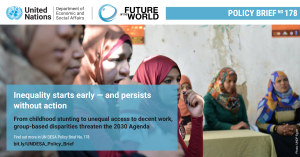Persistent inequalities based on group characteristics—such as race, ethnicity, disability, and income—continue to shape people’s opportunities from birth through adulthood. Despite commitments under the 2030 Agenda and progress in promoting inclusion, inherited disadvantages still account for a large share of income inequality in many countries. These disparities, often passed from one generation to the next, reflect interlinked barriers in health, education, and employment that prevent entire population groups from fully participating in society.
Social exclusion often begins in early childhood and compounds over time. Children from the poorest and most marginalized households are more likely to experience stunting, limited access to education, and inadequate services. Although there has been improvement in child health and school attendance globally, the pace of change is uneven. For instance, stunting among the poorest children is declining too slowly to close the gap with the wealthiest by 2030, and secondary school attendance disparities across ethnic and income groups may not be resolved before 2085 without urgent, targeted interventions.
Labour market inequality remains a major barrier to inclusion. People with similar educational levels can experience very different outcomes depending on their social group. Persons with disabilities, for example, are much more likely to be excluded from formal employment, even when they achieve advanced education. This underscores the need not only for better access to education, but also for inclusive labour policies that address structural discrimination and provide real pathways to decent work for all.
Reliable, disaggregated data is essential to identify and address inequality—but current data systems are under threat. The brief warns that the discontinuation of the Demographic and Health Surveys (DHS) could severely hamper efforts to track social exclusion, particularly in low-income countries. It calls for international cooperation to sustain and improve data collection systems, especially as the world prepares for the Second World Summit for Social Development in November 2025, which offers a platform to renew commitments to leaving no one behind.
 Welcome to the United Nations
Welcome to the United Nations
